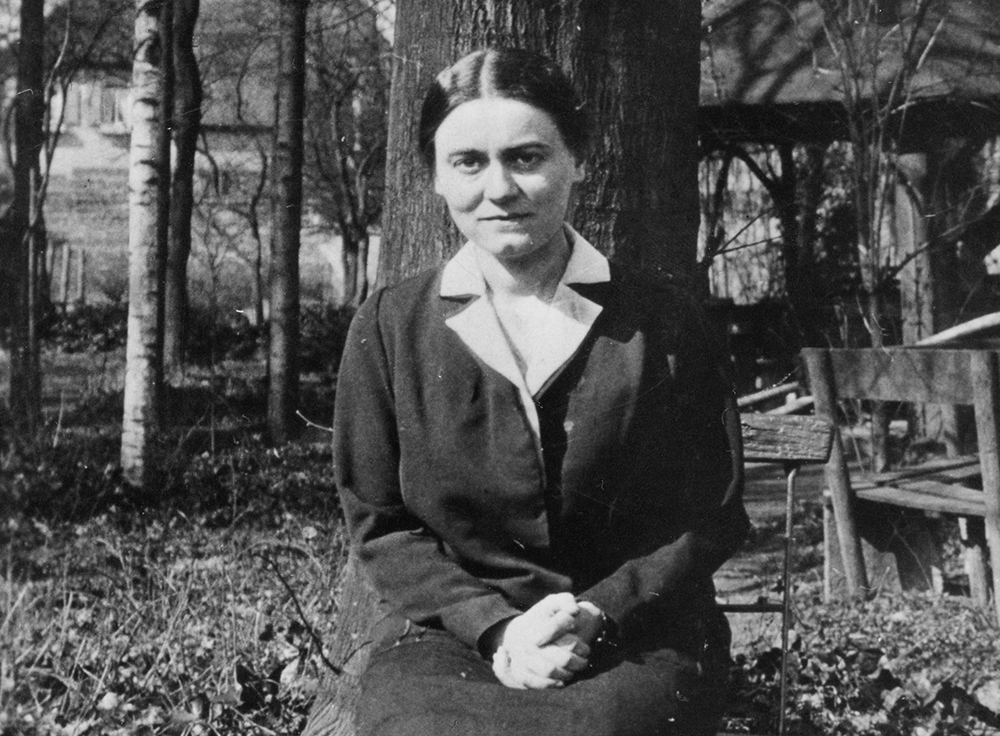
PROSPECT HEIGHTS — In 1891, Edith Stein was born as the youngest of 11 children into a pious Orthodox Jewish household living in Germany. A little over 100 years later, she became one of the six patron saints of Europe, after living a life of deep Catholic devotion during the Nazi regime.
St. Edith Stein converted to Catholicism after her philosophical education cultivated a belief in the Church’s teachings.
Also known by her religious name, St. Teresa Benedicta of the Cross, St. Edith Stein lived her life as a Carmelite nun during the Nazi regime, and she openly campaigned for issues relating to women’s rights and education before she was taken by German forces to the Auschwitz concentration camp. There, she was killed by toxic gasses in 1942.
“She’s a martyr for the Catholic Church. She’s a martyr for Jews who are interested in the Holocaust. She’s somebody who stood up for her heritage. She was very strong and yet she lost her life just terribly,” said Linda Burghardt, scholar-in-residence at the Holocaust Memorial and Tolerance Center of Nassau County.
Born during Yom Kippur on Oct. 12, 1891, in Breslau, Germany (now Wrocław, Poland), Edith Stein was raised by her single mother, as her father had died when she was 2 years old. As a teenager, she became a self-proclaimed atheist.
Later in life, she attended the University of Gottingen, earning her doctorate in 1916 and emerging as a philosopher during the end of World War I. It was during that education that she was exposed to the Catholic philosophical teachings, including those of St. Thomas Aquinas.
Compelled by the autobiography of St. Teresa of Avila, Stein was baptized a Catholic on Jan. 1, 1922. After her conversion, she lived as a teacher and scholar at a Catholic school of education in the German city of Speyer.
However, she was forced to quit her teaching position in 1933 because the then-established Law for the Restoration of the Professional Civil Service required an “Aryan certificate” for civil servants in Nazi-governed Germany.
Stein denounced the Nazi regime as early as April 1933, in writings she sent to Pope Pius XI. Her perseverance is an example to all, Burghardt said, particularly to women, for whom Edith Stein worked diligently to educate.
“And one of the things she said, and I love this quote, is, ‘The world doesn’t need what women have. It needs what women are.’ I think that’s just such a wonderful message for women today,” Burghardt said.
Stein joined the Carmelite Order in 1934, and in 1938, she and her sister Rosa — also a convert to Catholicism — were moved to a monastery in the Netherlands to escape the growing Nazi oppression.
On Aug. 2, 1942, she and Rosa were arrested by the Gestapo and were transferred to the Westerbork assembly camp in the occupied Netherlands, according to the website of the Auschwitz Memorial and Museum. The sisters were taken to Auschwitz on Aug. 9, where they were gassed upon arrival.
The arrest came after resistance from the Catholic bishops of the Netherlands, who refused to remain silent about the Nazis’ deportation of Jews, even when the Nazis offered to exempt Jews who converted from Judaism to Catholicism from deportation if the bishops kept quiet.
The Nazi response was swift. More than 400 Catholic Jews were taken by the Gestapo, and of these 113 were murdered at Auschwitz, according to NCR.
St. Edith Stein was beatified as both a martyr and a confessor, a distinction few hold, by St. Pope John Paul II on May 1, 1987. She was deemed a martyr because she and her fellow Catholics in the Netherlands retaliated against Nazi oppression.
The appellation “confessor” is because of her philosophical work, and efforts on behalf of Catholic women. Her canonization occurred on Oct. 11, 1998, the day before the 107th anniversary of her birth. She became the first Jewish woman to convert to Catholicism and be canonized, according to the Auschwitz Memorial and Museum.
In the Diocese of Brooklyn, the Contemplative Community St. Edith Stein is headquartered at the Most Precious Blood Monastery. Founded in 1998 in Flatlands, Brooklyn, the community continues the mission of St. Edith Stein.
“It is part of our Christian living and an obligation of the Christian to follow Christ. … She can very much teach us that aspect of discipleship in our Lord’s words, where he invites us to take up our daily crosses,” said Sister Mary Mother of the Nativity, prioress of the Contemplative Community St. Edith Stein.
“If young people can learn to do even the tiny [acts] and look up to the people who become saints, there’s a very good chance it will make them better people. By extension, by extrapolation, that makes the world a better place,” Burghardt said.
